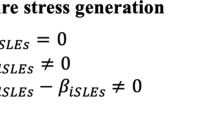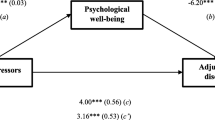Summary
A group of 71 patients were interviewed seven months after they had been screened for a new episode of unipolar depressive illness and the relationship between symptom severity at this time and the life stresses experienced over this period investigated. On the basis of the follow-up assessment, patients were divided into a ‘well’ and ‘ill’ group. The mean number of life events experienced during the study period did distinguish patients ‘ill’ from patients ‘well’ at follow-up but with less success than has been claimed for onset. Further analysis took into account both the severity of life stress suffered and the time of its occurrence. This improved the discrimination. Both time of event occurrence and event severity were then included in a model of adversity in which it was postulated that event stress dissipates with time. Application of the model to the study data resulted in the statistical relationship between life stress and outcome being somewhat strengthened. The possible implications of this result for further research in life stress are discussed.
Similar content being viewed by others
References
Brown, G. W., Harris, T.: Social origins of depression: A study of psychiatric disorder in women. London: Tavistock 1978
Brown, G. W., Skiair, F., Harris, T, O., Birley, J. L. T.: Life events and psychiatric disorders. Part I: some methodological issues. Psychol. Med.3, 74–87 (1973)
Clayton, P. J.: Mortality and morbidity in the first year of widowhood. Arch. Gen. Psychiatry,30, 747–750 (1974)
Hamilton, M.: A rating scale for depression. J. Neurol. Neurosurg. Psychiatry23, 56–61 (1960)
Hamilton, M.: Development of a rating scale for primary depressive illness. Br. J. Soc. Clin. Psychol.6, 278–296 (1967)
Horowitz, M., Schaefer, C., Hiroto, D., Wilner, N., Levin, B.: Life event questionnaires for measuring presumptive stress. Psychosom. Med.39, 413–431 (1977)
Medical Research Council: Report by Clinical Psychiatry Committee. Clinical trial of the treatment of depressive illness. Br. Med. J.1965/I, 881–886
Miller, P. McC., Ingham, J. G.: Reflections on the life Events to illness link with some preliminary findings. In: Stress and anxiety, Vol. VI, Chap. 16 (eds. I. G. Sarason, C. D. Spielberger). New York: Hemisphere 1979
Miller, P. McC., Ingham, J. G. and Davidson, S.: Life events, symptoms and social support. J. Psychosom. Res.20, 515–522 (1976)
Mindham, R. H. S., Howland, C., Shepherd, M.: An evaluation of continuation therapy with tricyclic antidepressants in depressive illness. Psychol. Med.3, 5–17 (1973)
Surtees, P.G.: Psychosocial factors in depression: a follow-up study of patients after recovery. PhD thesis (unpublished), University of Edinburgh 1978
Author information
Authors and Affiliations
Additional information
This work was supported by the Science Research Council, the Mental Health Research Fund (Scottish Division) and the Medical Research Council.
Rights and permissions
About this article
Cite this article
Surtees, P.G., Ingham, J.G. Life stress and depressive outcome: Application of a dissipation model to life events. Soc Psychiatry 15, 21–31 (1980). https://doi.org/10.1007/BF00577958
Accepted:
Issue Date:
DOI: https://doi.org/10.1007/BF00577958




